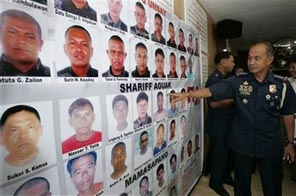Philippine police seek 161 suspects
MANILA: Philippine police on Wednesday named 161 suspects in the massacre of 57 people last month in the country's worst election violence, including government militiamen led by members of a powerful clan facing murder and rebellion charges.
Witnesses have said Andal Ampatuan Jr., a scion of the clan, led the group of militiamen who attacked a rival's convoy on Nov. 23 in thesouthern province of Maguindanao, national police Chief Jesus Verzosa told reporters. The dead included 30 journalists and their staff.
He said witnesses told investigators Ampatuan himself shot some of the victims in Ampatuan township — named after his family, which has ruled the impoverished province unopposed for years. The bodies borebullet wounds in the mouth and chest fired from close range, Verzosa said.
Police said the bodies of some of the 21 female victims were mutilated, including their sexual organs. Authorities earlier said at least five women may have been raped.
Police said the militiamen, all but two at large, were identified by witnesses Tuesday. Their names will be submitted to prosecutors to be included in the charge sheet and court warrants of arrest.
Photos of about 100 newly identified suspects were displayed at thenational police headquarters in Manila. Of the 161 suspects identified by authorities, 100 are militiamen and the remainder are members of the Ampatuan clan or are police, army and local officials working for the Ampatuans. About 30 have been arrested.
Ampatuan turned himself in three days after the Nov. 23 killings and denied involvement. His father — family patriarch Andal Ampatuan Sr. — four brothers and 19 others who were later arrested were indicted Wednesday on the separate charge of rebellion.
A Department of Justice statement cited witnesses and investigators as saying the patriarch had ordered his private armies to "combat the government to death" if members of his clan and other supporters were arrested.
Heavily armed members of the clan's private armies fled to mountain villages to hide, ready to attack in case the Ampatuans were arrested, the statement added.
Last week, President Gloria Macapagal Arroyo declared martial law in Maguindanao, allowing government forces to arrest other members of the clan without waiting for court warrants and order some 2,400 loyalists to surrender their weapons.
Security forces have recovered dozens of weapons and about half a million ammunition rounds in and near properties of the clan. Officers and soldiers returned to a warehouse they raided earlier and found more ammunition hidden in the concrete wall, said military spokesman Lt. Col. Michael Samson.
Air force planes and helicopters dropped thousands of leaflets urging Ampatuan followers to give up or face an assault.
"We have to resolve this case peacefully," Verzosa said. "We are urging them to surrender and then the normal processes of the law and prosecution should be held."
The head of the independent Commission on Human Rights, Leila de Lima, said her agency would also investigate allegations in a letter from anonymous citizens blaming the Ampatuans for at least 200 other killings in the area in the past. De Lima cautioned that the allegations had not been validated and did not provide details.
She said her office had asked the elder Ampatuan to comment on the allegations but he never responded.
Human rights lawyers, a former Senate president and three other groups asked the Supreme Court to declare the martial law proclamation unconstitutional, arguing that a breakdown of law and order in Maguindanao did not amount to a rebellion.
The court ordered the government to comment on the petition by Monday. It also granted the government's request to transfer the trial from Maguindanao to Manila, citing concern for the security of witnesses.
Arroyo's proclamation is the first use of military rule in the Philippines since late dictator Ferdinand Marcosdeclared it nationwide more than 30 years ago.
Congressmen and senators convened in a joint session Wednesday to begin debate on whether the martial law should be ended or extended. Arroyo's allies dominate the lower house.






